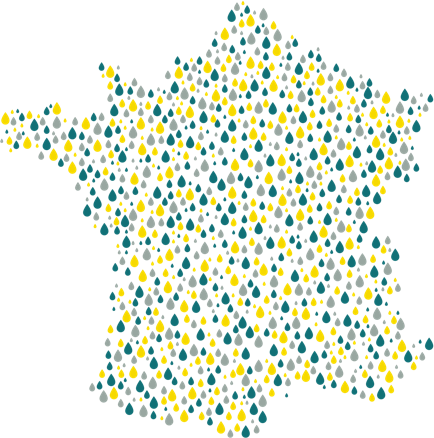Funding assistance
for individual sanitation
To find out about the existing systems in your sector and eligibility criteria, contact your local SPANC (Public Service for Non-Collective Wastewater Treatment) or your town hall.
Advantageous loans
- Zero rate eco-loan: anyone wishing to refurbish their old non-collective sanitation system or replace it with a new one that does not consume energy can receive the zero rate eco-loan (eco-PTZ). The amount of the loan must not exceed €10,000 and the repayment term can be extended to up to 15 years. Visit your bank to apply. Find out more about the eco-loan
- Family Allowance Fund (CAF): the “Housing Improvement Loan (PAH)” is available, subject to conditions, for the recipients of family benefits. The interest rate is set at 1% and repayments can be spread over a period of up to 36 months.
- Environment and Energy Management Agency (ADEME): The ADEME offers, subject to conditions, a zero rate eco-loan to refurbish your individual sanitation system. The maximum loan amount is €10,000. The repayment term varies from three to ten years.
Grants
This assistance only covers the refurbishment of existing Non-Collective Sanitation (NCS) systems and not the connection of new ones. There are different grants available depending on the body:
- Water supply agency: some water supply agencies offer a grant to refurbish individual sanitation facilities diagnosed by SPANC as “at risk” or “absent”.
- National Housing Agency (ANAH): since 2013, the grant has been awarded subject to conditions of resources and in addition to assistance from the water supply agency.
- Pension fund: assistance granted for work to improve your main home. To benefit from it, you must receive a pension through the general scheme. This grant is only available for work undertaken on the owner’s main residence. The amount of this assistance is calculated according to the total cost of the work as well as the owner’s resources.
- Departmental council: some departmental councils support refurbishment projects through municipalities. Assistance can therefore be offered to owners.
- Municipalities and municipality communities: some municipalities and municipality communities subsidise refurbishment projects.
European Life Programme
The Financial Instrument for the Environment (LIFE) is integrated into the environmental policy of the European Union. LIFE contributes to the implementation, development and strengthening of community environmental policy and legislation as well as to the integration of environmental concerns into other European policies. The recipients of LIFE projects are companies, local communities, NGOs, research institutions and intergovernmental organisations.
One example is the Community of Haute-Provence:
“The Community of Haute-Provence has chosen to provide a financial contribution of 40% up to €5000 to upgrade plant-based non-collective sanitation systems within the framework of the European LIFE programme. The Community of Haute-Provence proposes to participate in the financing of 30 to 40 compliance upgrades of NCS systems using the phyto-purification system. The community will provide a 40% subsidy on study and installation up to €5000. This system only covers compliance upgrades for existing systems. Its aim is to promote alternative, economical and environmentally-friendly solutions for the treatment of wastewater.” Source: Haute-Provence Info, 15/03/2013




